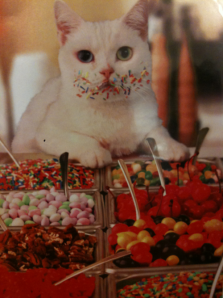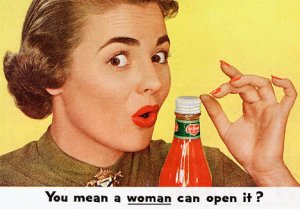Heya, quirky sweethearts.
Most of you reading this fall into that age gap where you remember Harriet the Spy and probably read Ramona books growing up. And, it might seem silly, but I want to start off this post asking you to fish through your memories, sift through your parent’s stories, your grandparent’s stories, and tell me what consumerism looked like from the baby boomer perspective and forward. I mean, post WWII folks consumed more butter than Paula Deen, they bought new furniture, new clothes, cars, houses, etc. Being young meant making a path for yourself in the world, a highway scattered with the flora and fauna of Fridgidaire and Ford.
And now, when faced with their past decisions, the baby boomers have begun to question their legacy. Forbes magazine conducted a poll back in 2009 asking the boomers what they believed their legacy to be—and just under half responded, “Ushering in an era of consumerism and self-indulgence.” However, the author of the article makes sure to point out the disparity in the era of the boomers. While other decades were united by massive events such as WWII and the Depression, boomers were divided by “Incendiary topics including the Vietnam War, civil rights, women’s liberation, sexual freedom and drugs.”
It’s also important to note the spread of media at this point in time. Look at the way marketing advanced and TV audiences became the prime targets of ads promoting consumerism. In putting all these things together, I wonder if this generation’s stratification and social climbing was a side effect of rampant acknowledgement and fear of differences coupled with television’s ingenuity. Do you see how purchasing the same goods as the people you respect makes you respectable—read, one of them? Then you can see how consumerism became a way in which people climbed social ladders both allying themselves with those they desired to represent and distancing themselves from the those they disliked.
Now, my plan in this essay isn’t necessarily to hate on the hungry dreams of my grandparents. Rather, I’m making a verbal Venn diagram between them and myself. I’ve come to realize that I want to understand individual motivation and how that translates into social change or even large scale lifestyle movements. I mean, the Forbes article goes on further to explain the poll by breaking its pool down into demographics. This complicates the idea of most boomers being obsessed with commercial behavior and upward movement. The author points out that women and people of color tended to respond by choosing the more positive legacy option: “Helping to bring lasting change in social and cultural values and ending a war.”
This probably seems like a convoluted break-down of an easy topic. But, I wanted to work through it because I’ve become interested in the lifestyle of the modern hipster, who falls into such a category, and what they are doing for the world. It’s not as unrelated as it seems.
What are hipsters known for? Well, aside from weird fashion and other eclectic tastes, they can often be found sporting used clothing, carrying flea-market furniture carefully around the bikes parked in their living rooms, or maybe even carrying bags of vegan groceries from the local produce stand. They are queer, they are of color, they are women, they are men seeking to redefine masculinity. All these qualities, life style choices etc, seem to shed a brighter light on the idea of the hipster. I want to stand back and acknowledge these people as facing adversity (just as the boomers did in the 60’s) and instead of being afraid of each other’s differences, they choose to appreciate the beauty of such disparity. In doing this, I feel as though people are coming closer to viewing themselves as inhabitants of one earth rather than this country, that country, etc. It’s all so fascinating because the general idea of the hipster complicates all this unity. Aren’t they supposed to be counter-culture, unique, individuals??
Are they changing this perception by creating their own culture that doesn’t exist counter to the mainstream but rather co-exists? I mean when we view ourselves as part of small demographic, is it easier to find unity in each other rather than commercial goods?
I recently read an article on Fox news from 2010 that seemed entirely bent on destroying/pigeonholing/bastardizing the identity of the hipster. The author, one un-funny, Stephen Crowder seems to think that all people who wear thrift store clothes, listen to records, and go to college are probably hipsters. I bet he thinks all black people love Tyler Perry too. The thing that irked me the most about this article is that his main issue with the hipster is that they seemingly don’t operate in the real world while still feeling free to criticize from the “peanut gallery.” He’s suggesting that all people who look how he’s described a hipster to look don’t care for anything but themselves and their oh-so-cultured opinions. This article is a paradox. It’s an article criticizing people who are thought to criticize. UGH.
(comic by Dustin Glick)
I suppose it’s time to pull all my rambling into one coherent moment. (I’m quaking in my favorite thrifted boots).
If I—as someone who wears thrifted clothes, belongs to a minority, composts, and bikes to work—am going to be labeled and pigeonholed as a despicable hipster, then I accept, GODDAMNIT. Look at the legacy of the boomers who were focused on their own mobility. I don’t want to be there in 40 years: wondering what was more worth living for, my friends and my world, or my Cadillac.





Leave a comment